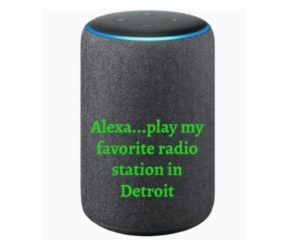
The client was the Southeast Michigan Ford Dealers Association which piloted a campaign on the smart speaker. When Detroit listeners asked their smart speaker to play one of Cumulus’ local radio stations, a 15-second pre-roll ad ran before the station began. Here’s how Cumulus says the results of the campaign turned out.
Cumulus concluded that listeners exposed to the smart speaker pre-roll ads were more likely to be aware of the Southeast Michigan Ford Dealers Association.
To measure the impact of the Southeast Michigan Ford Dealers Association smart speaker campaign, Cumulus retained MARU/Matchbox to conduct a campaign effect study. 385 Cumulus Detroit listeners were surveyed back in November 2020.
Some listeners in the survey listened to the stations on their smart speaker device and had an opportunity to be exposed to the campaign. The remaining listeners tuned to the stations did not have a smart speaker and were not exposed to the campaign. Cumulus says the “difference in brand equity between the exposed and unexposed groups represents the lift from the smart speaker campaign.”
As part of the study listeners were asked for their familiarity with the Southeast Michigan Ford Dealers Association. Cumulus concluded that smart speaker listeners to their stations were 24% more likely to say they were “extremely familiar or very familiar” with the Southeast Michigan Ford Dealers Association, 42% exposed versus 34% unexposed.
And, according to Cumulus, 31% of those exposed to the smart speaker pre-roll ads for the Southeast Michigan Ford Dealers Association said they were very likely to visit a Ford dealer in the next 3 months. 19% of those not exposed said they would visit a Ford dealer. “The smart speaker campaign generated a +63% greater likelihood to visit a Ford dealer.”
Get more details on the campaign from Pierre Bouvard’s latest blog HERE.






WLS has been doing this in Chicago as well and it’s annoying as hell. Let me warn all of you: younger demos have no tolerance for stuff like this. They despise ads – in fact they HATE them. They will tolerate a quick spot here and there (which is actually how radio did this in the 60s and 70s) but they absolutely refuse to sit through the mega stops sets that big groups now employ.
A 5 second spot at call up might work because its too fast to do much about – but 15? That’s long enough for the listener to say “Alexa STOP” and to go elsewhere.
This also likely required users to enable a custom skill and use something like rsmediaserver to rotate the ads. Otherwise the user would get the tunein or iheart feed that runs their own pretil without the station getting a cut even though that station is paying all of the royalties. It’s be interesting to know if they paid an aggregator on top or if they are just counting on listeners enabling their custom skill. IMHO all stations should have a custom skill and push enabling as part of the promotion of it. Then you can rotate timed pre-rolls of jocks, ads and all kinds of promos at 10 seconds or less.
in my opinion… if it’s longer than 7 seconds, listeners will not continue going to the station to listen. I witnessed local TV stations getting complaints about their “pre-rolls” before each story. BIG mistake at 15 seconds… BIG